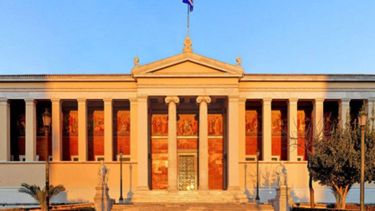An English-language course from the National and Kapodistrian University of Athens promises a hands-on experience for students to make sense of the past
International students have a unique opportunity to study the culture of ancient Greece and some of the country’s most important archaeological monuments at a highly respected university.
National and Kapodistrian University of Athens (NKUA), a research university founded 185 years ago, was the first university in Greece, the Balkans and the Eastern Mediterranean. The Athens-based institution has 7,600 international students among its 68,500-strong student body, enrolled on 43 undergraduate and 220 postgraduate programmes.
It counts two Nobel prizewinners, 15 former prime ministers of Greece, three former presidents and countless notable researchers in diverse fields among its notable alumni. NKUA’s enviable research reputation has seen it rank in the top 100 universities for Google Scholar Citations for five consecutive years. Most recently, it ranked 92nd in the world, 18th in Europe and first in Greece.
NKUA now is offering international students a bachelor’s in the archaeology, history and literature of ancient Greece, taught exclusively in English. The four-year, full-time programme is devoted to the study of Greek antiquity.
International students investigate the culture of ancient Greece while acquiring first-hand knowledge of some of Greece’s most important archaeological monuments and sites, such as the Acropolis of Athens and the Parthenon.
Based in the land where philosophy was born, the course is offered by the School of Philosophy, which includes 13 departments, 15 study halls and Greece’s second-largest library.
The bachelor’s degree in the archaeology, history and literature of ancient Greece, which is the first course offered by a Greek university to be taught in English, includes courses in Greek archaeology, ancient Greek history and literature and modern Greece.
Offering students a truly hands-on experience, the programme combines experiential learning, systematic disciplinary knowledge and critical and creative thinking to help students make sense of the past.
As part of the curriculum, there are field trips to archaeological sites and museums in Athens and further afield, with excursions around Greece including the Peloponnese, central Greece and Macedonia, along with Santorini, Naxos and Crete. Students are also introduced to archaeological excavation theory and practice.
The four-year course is divided into eight semesters. The first year includes foundation courses in the history and culture of ancient Greece, as well as an introduction to the methodology of the respective academic fields of archaeology, history and philology.
The degree is suitable for high school graduates with an interest in the ancient world and its cultural and intellectual achievements and for anybody seeking a broad liberal education with an emphasis on original thinking.
Applicants must have at least B2 level English to secure a place on the course, which costs €6,000 (£5,030) per academic year, to be paid in two instalments in late August and late January.
Find out more about the bachelor’s in the archaeology, history and literature of ancient Greece at NKUA.



